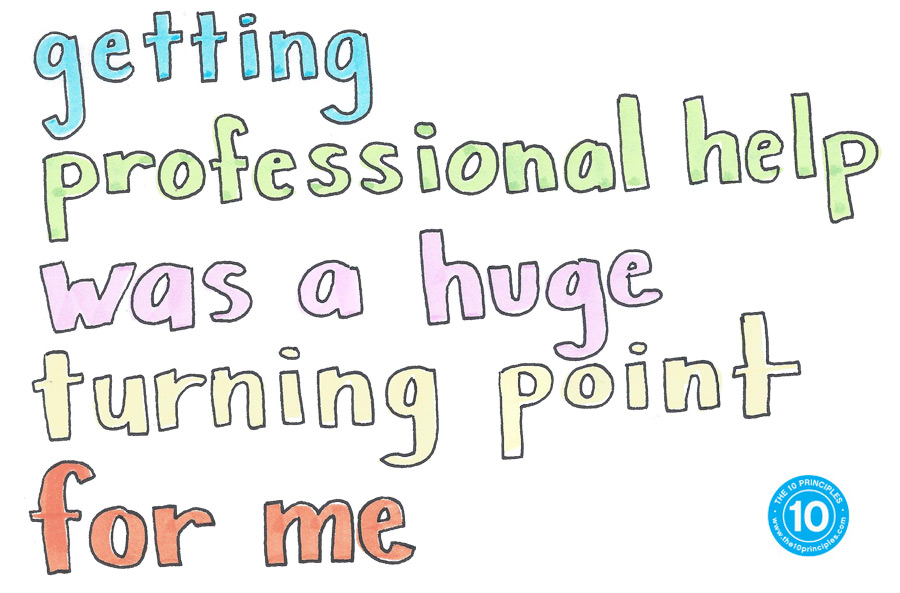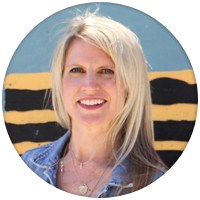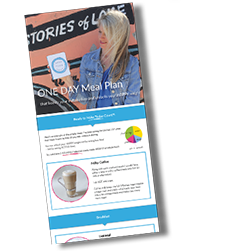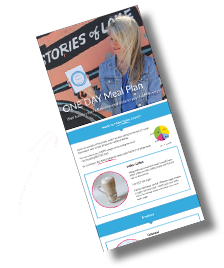
- Why I needed professional help
- Professional help was COMPLETELY different than I thought it would be
- Why getting professional help was THE BEST decision of my life
What is “professional help”?
There’s a lot of misinformation and stigma around those 2 words.
People even use them as insults, saying:
Wow! You need professional help.
The truth is we ALL need professional help.
Communities are made of people who are d*mn good at what they do. Think of the main street closest to you… That strip is stacked with people who are experts in their field.
You’ll see a florist, veterinarian, mechanic, coffee barista, and countless other people pursuing interests that meet your needs.

Each job requires training and then practice to gain priceless experience.
Why?
So YOU can get professional help.
Life’s not long enough for us to become educated about everything.
Professional help saves you time
The best part about talking to people who are good at what they do, is that they get the job done.
Then YOU can get back to what you’re good at.
…It would NOT have taken me 10 years to lose 10 pounds had I had earlier intervention.
Why I needed professional help
Along with learning:
- What healthy eating looks like
I didn’t know diet drinks and skim milk make it harder to lose weight - What healthy exercise looks like
I had no idea that too much exercise confuses your body and slows down your metabolism - How to make change lasting
I thought willpower was the answer, now I understand you need to build healthy habits
…I also had an underlying issue that needed to be addressed.
My underlying issue
At the time I didn’t know I was struggling with mental health. Instead I worried I lacked the discipline to stick to my (strict) weight-loss plans.
Now I know I have Obsessive Compulsive Disorder (OCD).
Without realizing I’d become fixated on perfectly following all the diet rules, tips and tricks I’d collected.
For instance, I’d:
- only eat fruit before noon
- blot oil off my pizza
- chew food 10 times before swallowing
…and I followed 100’s of other random restrictions that made my eating disordered.
Days and days of under-eating and over-exercising lead to binging and eventually purging.
Armed with the WRONG weight-loss information and tunnel vision (OCD makes whatever goal you set more important than anything else), I was destined to FAIL.
Not just at losing weight, but in every area of my life.
I could not move on to another task until I completed this one.

Why I got professional help
Eventually I was so preoccupied by dieting and punishing myself for making even the tiniest choice I regretted, that my daily life became disrupted. School, sports, extra-curricular activities and anything social suffered.
I punished myself via:
- purging (food and eventually my belongings)
- increasingly extreme diets
- not allowing myself to do things I loved; even simple things like patting my dog
Soon I’d dropped out of everything to focus on getting healthy. But in hindsight this decision gave me more time to:
eat the WRONG food
exercise the WRONG way
& use the WRONG weight-loss strategy; weight loss is NOT about WILLPOWER!!!
The only productive thing I was doing was attending class sporadically.
One day I was walking through campus, about to plan my next diet (part of the vicious cycle of starving, binging and purging) when it occurred to me how disconnected I felt from myself.
How many things have to happen to you before something occurs to you?— Robert Frost, poetAnd I missed who I used to be.
This realization hit me right before my first set of exams during my first year of university.
Shortly after I brought myself down to the student medical center and made an appointment.
Why?
This scene from orientation week, kept replaying in my head:
All the students in my department had been invited to a beautiful building to be welcomed by the school chancellor. Most of his speech was upbeat and congratulatory. But at the end his voiced echoed around the cathedral-high ceilings with these words:

Why I hesitated to get professional help
- I thought everything that was going on was SIMPLY because I wasn’t working hard enough to lose weight
- I wanted to prove I could stick to my diet so I could believe in myself again
- I was sure being STRONG was about figuring things out on your own
I also had this idea that the doctor would think I was weak for not being able to lose weight and be angry I was wasting her time.
In short… I was clueless about what was happening.
Thank goodness for my fear of flunking out of school. My upcoming exams created an urgency to act; one that trumped my OCD impulses just long enough for me to ask for professional help.
In the end our interests save us—whether it’s goals we’ve set or people we love.

Now I know being a strong person is about:
- opening up to people you trust
- listening to new ideas
- asking for help, including professional help
- trying strategies that feel foreign
- being honest about set backs
- building in accountability
Be proud of yourself for seeking professional help!
You need to know that part of being strong and tough is having the courage to ask for help when you need it. You must not silently suffer… Asking for help was one of the best decisions that I ever made. You will be continually amazed about how life changes for the better once you put your hand up. It’s not easy and there are no quick fixes but it’s about being the best version of yourself for you and those around you.
-Prince Harry, Invictus Games Creator
What happened when I got professional help
It was c-o-m-p-l-e-t-e-l-y different than I thought it would be.
The medical center on campus is basically like a walk-in clinic. So after waiting for a while I got to see a doctor who simply asked me to describe what my regular day looked like. So I explained the secret I was ashamed of as best I could (and unexpectedly broke down). Then I was referred to a psychiatrist who specialized in disordered eating.
A few days later I met with the specialist who asked me what my thoughts were on various types of food and how I thought our bodies work.
I also filled-in a form that had a bunch of questions.
After a few appointments my doctor diagnosed me with OCD. Then we set a regular time to meet each week.

Professional help supported me in un-learning WRONG information
During my weekly session my doctor helped me challenge the misinformation I had about eating and exercise. And he explained how to break bad habits and form healthy habits.
For instance, I remember the following conversation:
Doctor: Would you eat an ice cream sundae?
Kelly: No. Never.
Doctor: Why not?
Kelly: Because it will turn into fat.
Then my doctor explained that if you meet your body’s needs regularly, eating an ice cream sundae doesn’t make you gain weight.
My doctor was always very kind and respectful. Nothing like I’d feared.
Here’s another conversation that was key:
Doctor: Do you see patterns in your life?
Kelly: No.
Doctor: Starving, binging and purging is a pattern.
Kelly: I thought I had stretches of willpower and then in a weak moment I ruined everything.
Doctor: OCD is like having a needle stuck in the groove of a record, so the same line of a song is sung over and over again. It’s important to first recognize repeated behaviour, like starving, binging and purging. Then you can learn to interrupt these self-defeating patterns.

Professional help blasted open my tunnel vision and helped me see the big picture.
The sooner you ask for professional help the better
Don’t wait until you have a big problem before you ask for help. The goal is to get help to PREVENT a big problem.
I was in my 6th year of having a complicated relationship with food before I got professional help. So I had 6 years of ingrained bad habits that I needed to unlearn. The earlier you get help the faster you’ll get back on track.
Professional help can identify underlying issues
Don’t put a band-aid over an axe wound. If your pursuit of weight loss is interrupting other parts of your life, you likely have an underlying issue that needs to be addressed.
Why?
Even if you get your disordered eating under control, if you don’t heal your underlying issue, it will pop up in another part of your life and make it disordered.
On the flip side, once you understand your underlying issue, it can be a huge asset. Your superpower!
Being determined to see a project through to the end has helped me so much in my life. Especially now that I’m better at identifying when I’m over-doing something and it’s time to stop. And having people who know and love you in the loop also helps! Alex often redirects me when I get tunnel vision and need to let go of something so I can come back to it the next day with fresh eyes.
The following underlying issues can contribute to disordered eating:
- Dieting
e.g. dieting makes people obsessed with food and weight and heightens the feelings of guilt and shame around eating - Trauma
e.g. survivors of sexual or physical abuse can struggle with the feeling of a lack of control - Biology
e.g. states of semi starvation (like those experienced from dieting) can trigger obsessive behaviour around food - Family
e.g. stressful or chaotic family situations can ignite or exacerbate unhealthy relationships with food - Genetics
e.g. people can have a predisposition for eating disorders - Sociocultural Ideals
e.g. media adds to unrealistic body ideals - Temperament
e.g. perfectionism can create an unhealthy relationship with food - Coping Skills Deficit
e.g. binging and purging, etc. can develop as a relief from emotional pain
No matter how far you feel you need to climb to get to where you want to go, you CAN get and stay healthy. And each step is rewarding!
I learned first hand, BIG problems don’t need big solutions! You’ll be surprised how quickly your life gets better.
Normalizing your relationship with food IS possible
for anyone who makes health a priority.
Additionally—when you focus on being healthy instead of thin
you’ll NATURALLY reach and maintain
a healthy weight.
What you need to know about professional help
You should not be ashamed.
Anything you’re embarrassed to talk about, happened because you need professional help. Choices you regret are not a reflection of your character. Anyways, those who give professional help have heard it ALL before! I always tell myself “you’re not that special or that weird to be the only one.” 🙂
Not speaking to a doctor when your daily life is disrupted, is like refusing insulin when you have diabetes.
If your doctor isn’t respectful about your concerns, seek professional help from another doctor.
Advocating for yourself is YOUR responsibility. We need you to get healthy so you can get back to what you’re good at!
Make Today Count

Write down in point form, what your typical day is like now. What activities or behaviours are disruptive?
Then make an appointment with your family doctor or go to a walk in clinic.
Your medical professional will direct you toward the next steps of getting professional help.
You can do this!
Build healthy eating and exercise habits. A healthy weight will follow.

Next Steps
Have you been preoccupied by trying to lose weight for a while? Are things getting worse instead of better? If this is the case it’s a good time to seek professional help and take advantage of the INCREDIBLE opportunity to speak to an expert. They’ll help you get to the bottom of what’s going on. Then you can go after all your goals without an obstacle (like an underlying issue) in your way.
Along with breaking down barriers, it’s important to have good eating, exercise and habit-building information. Sign up for my newsletter (below) and I’ll send you a strategy TODAY that took me 10 years to figure out.
Ever wonder how you ended up somewhere?
Reaching out is all part of having a GOOD LIFE.
Professional help can guide you to where you need to go.
Do you know anyone who could benefit from reading this post? Please share with those you care about.

 These kinds of meals and snacks unlocked my HAPPY weight 21+ years ago (I lost 30 pounds without dieting!)
These kinds of meals and snacks unlocked my HAPPY weight 21+ years ago (I lost 30 pounds without dieting!)
You'll also be subscribed to my newsletter. Don’t like it? Unsubscribe in one click

 These kinds of meals and snacks unlocked my HAPPY weight 21+ years ago (I lost 30 pounds without dieting!)
These kinds of meals and snacks unlocked my HAPPY weight 21+ years ago (I lost 30 pounds without dieting!)
You'll also be subscribed to my newsletter. Don’t like it? Unsubscribe in one click




Sharing what I learned makes the 10 years I STRUGGLED worth it





